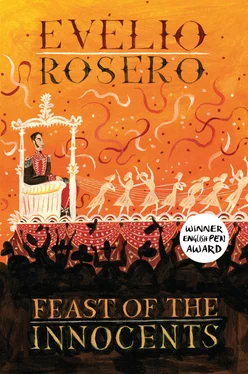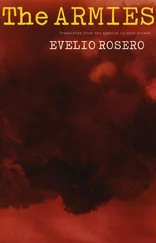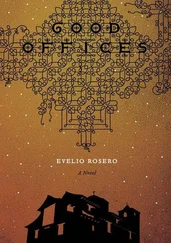He smoked with pleasure, streamers hung around his neck, confetti brightening up his eight-day beard with colour. They offered him aguardiente straight from the bottle, and he accepted. His face was painted, but even so, he thought, it was perfectly possible they recognized him; Pasto was a very small world: on any corner the whole population would find you. He imagined the faces the bishop and his learned friends would make if they discovered him right by the townhouse, as though about to go in or having recently come out. They’d be jealous, he thought, although the Wasp would excommunicate me anyway.
But what am I saying, he thought immediately, protect me, oh Matías, protect me, little brother of mine, wherever you are, whatever hell or paradise you’re in, though I know very well you didn’t believe in those places; you used to say: “The day you die you turn into a mosquito, and that’s that.”
None of his friends did surprise him that day. He never imagined who he would bump into.
“Well,” Primavera said, “this is certainly a mistake.”
She was dressed as an equestrian: black whip in hand, fitted jacket, her hair drawn back under a little round black cap. In her painted face her blue eyes distinguished her from the rest, as did her voice. Yes, it was Primavera; he was stunned. Her white riding outfit, blackened with handprints at her breasts and on her back, her bottom, gave a good idea of how much attention she had been paid that day, no doubt entirely to her liking, he thought. Her voice and the slight swaying of her body — she was speaking with her arms out as if preparing to fly away or as if already in flight — proclaimed her growing drunkenness, if she were not already completely inebriated:
“My Doctor Donkey emerges from a fine establishment, the most highly prized in Pasto, the most expensive, exclusive preserve of family men, civil servants and even undercover priests. In fact,” Primavera carried on with her reprimand, but now her voice changed, became intimate, wistful, “one never stops admiring those girls, once I dreamed of joining them.”
Her companions had already moved off: they were going along in a chain, men and women interspersed, holding on, one behind the other; at last they stopped to wait: they had guessed what the great mix-up was about and were enjoying it, furtively. Near to Primavera and the doctor, a nineteenth-century carriage, pulled by a mule bright with garlands, full of defiant girls as yet unpainted, was suddenly boarded by a mob of merrymakers: the shock absorbers creaked, springs popped one by one, the occupants of the carriage were thrown from side to side, and finally the excessive weight cracked the axles, which split, sending everyone crashing down, untold bodies on top, a heap underneath, tangling and untangling in dizzying fashion, so many arms and legs, so many faces slyly rubbing against each other like desperate kisses, greedy hands diving inside clothing, mouths and laughter and screaming, the whole street was erupting in howls, the mule collapsed, fell down in a dead faint, kicking out dangerously among the heads of girls and drunks, cries of panic rang out over cries of rejoicing. Primavera’s companions, among whom General Aipe might very well be found — the doctor thought — ran to see the accident up-close. Primavera did not turn a hair: she stayed where she was.
“How was it, Doctor Donkey?” she asked.
“How was what?” the doctor asked. He genuinely did not understand her. They looked at one another closely, the same two enemies from that morning, confronting each other.
“With the girl, Doctor Donkey, or should I say girls ? After shimmying about so nicely with that little saint, you’re up to any miracle, aren’t you?”
“What girl?”
Primavera burst out laughing.
“Oh,” Doctor Proceso said, “the girl. I’m waiting for her, I’m going to present her to Belencito Jojoa.”
Primavera Pinzón, who was already going back to her group of friends, stopped, frozen in her tracks. She turned to him, eyes glowing: surprise lit up her face, in spite of her having it blackened. It really was as though she had flushed, and the flush showed through in the astonishment in her voice:
“Can it be? You’re finally taking Belencito his woman? What a great friend, what audacity, my hero.”
She stood on tiptoe, briefly, up towards the doctor and, briefly, kissed him hard on the lips.
“Shall we go, Primavera?” her friends were calling. The people from the broken-down carriage had now got to their feet, bruised here and there, nothing major to report. Girls and drunks brushed off their clothing as if nothing had happened; even the mule came back to life: a bystander gave it aguardiente straight from the bottle; music and dancing took over again, playful shouting. But in the midst of the hubbub, there was a silence surrounding them.
“I’m staying here,” Primavera said. “I’m staying with my lawfully wedded husband, as God requires.”
No-one in the group objected. One behind the other, hanging on around the waist, playing choo-choos like children, they danced off again into the crowd.
Primavera dangled from the doctor’s arm. He thought she was going to fall; he embraced her.
“We’ll wait for your girl,” he heard her say. Her voice sounded splendid: a happy ultimatum.
That very moment Darkness appeared in the doorway. She was carrying a small suitcase under her arm, no doubt containing the nurse costume, or was she leaving that dump for ever?
“How beautiful she is,” Primavera said. “A real jungle flower for Belencito Jojoa, courtesy of his humble servant Doctor Donkey, my devoted husband.”
Darkness could hear her. She approached them warily. She had to shake off a drunk who tried to anoint her cheek with the customary “lick of paint,” and she did so with a shove, no hesitation about it: the drunk rolled about on the pavement, did not get up.
“Nobody paints me,” Darkness yelled.
No-one else approached her.
And she stopped just inches from Primavera:
“Who’s this?” she asked. “She seems drunk, or is she pretending? Is it a trick? Pay me right now, or I’m not going anywhere. Shall I tell you how much?”
“Pay her now, darling, just a little something,” Primavera said. “Don’t you see it’s the most important thing to these girls? Pay her and let’s go by ourselves, I’m going to replace her.”
Without believing what he was hearing, the doctor held out various banknotes, which Darkness scorned: she shot a stream of green spit at Primavera’s feet, and went back inside the townhouse.
So that was how Doctor Justo Pastor Proceso López and his wife Primavera Pinzón ended up alone again, in the street, towards the height of carnival. Neither of them seemed to remember the early hours of that morning now, with the pious Sarasti on board, the clothes in the street and the nakedness. Nor did Primavera mention the bundles of money found on the bed; another immediate future held theirs in abeyance: Belencito Jojoa lying in his bed, waiting — not expecting anything — for the carnival surprise they were preparing.
The doctor did not believe — or could not, or did not want to — that Primavera would go through with standing in for Darkness. But he started to believe it, watching her walk along at his side with the air of a determined teenager; then he desired her: surely he desired her for that very reason. What must be will be, he thought, although it’d be best to walk about a bit so she can think better of it — that is, if you do happen to think about it, Primavera.
It was getting dark, and the sun, which until that moment had been lighting up the most intimate workings of the celebration, its nooks and crannies, its guts, now lay swallowed up by storm clouds; a foggy sky smudged the horizon, was it going to rain? Primavera did not say a word. The doctor waited. They moved away from Nariño Square, which bubbled with revellers, and continued their walk blindly, without destination: she believed, or seemed to believe, they were going to Belencito’s house, and he did nothing to dissuade her. They heard a fleeting conversation between two old men: “That bloke got bumped off ages ago,” “Well, that’s what happens if you go after married women.” She seized his arm: “Let’s have another drink,” and they went into one of those improvised tents at the edge of the carnival where, apart from dancing to the son played for them, carnival-goers ate and recovered, returned to the game or were ruined for ever. There they got carried away by the Ronda Lírica; listening with mounting excitement to their “Sonsureño,” “Agualongo,” “Sandoná” and “Cachirí.” The band members of the Lírica were vibrating along with the flutes and violins: they finished off with “La Guaneña.” At the first notes, Primavera jumped up to dance in the heart of the crowd: she leapt like a deer, pulled off her jacket, got rid of the cap, her hair tumbling down rebelliously, she spun around like she was floating and carried on dancing madly, jumping and whirling, in wild spirals, breasts swinging, occasionally accompanied by other frenzied dancers: very soon they encircled her, applauding, while the doctor observed her, fascinated. “La Guaneña” finished and she came back triumphant, like a flame, splendid, teasing; “I’m exhausted,” she said, but she did not seem so.
Читать дальше












